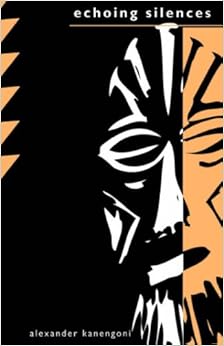 |
Book: Echoing Silences
Author: Alexander Kanengoni
Publisher: Baobab Books (1997)
ISBN: 1-77909-002-1
“Echoing Silences,” the riveting, mystic and brutal reconstruction of the liberation struggle by Alexander Kanengoni, is not merely a work of hindsight.
The Chimurenga classic is the burden of the past on the present, the bearing of the present on the future, the arrow that courses every direction.
It is a multi-layered reminder of the cost of Independence, the sacrifices that won Zimbabwe, and the debt owed by the living, chiefly the leading, to the martyrs of freedom.
There are no romantic abstractions, no revisionist templates in Kanengoni’s recollection of the war he fought in as a nationalist guerilla.
It is all real talk, live, human-centred and unexpurgated.
Kanengoni, who died barely a week to Independence Day, inclines his antenna to capture the spiritual strivings of the Unknown Soldier, yesterday on the front, today on the periphery, headed for oblivion and haunted by the ravages of war every step of the way.
The human capacity for inhumanity, particularly when power meets purposelessness, is often revisited by the protagonist in the atrocities of some nationalist leaders against the weakest of their own.
The fragile thread that binds fraternity often disentangles under unprovoked cruelty, disregard for life, celebration of malice and appropriation of a collective cause for private interest.
As the tragic hero, Munashe, exclaims throughout the novel, there is nothing to understand and no time to mourn the dead but to mourn the living – even as sacrifices are being offered in the bush, the mistakes of history already jeopardise the promise of freedom.
Munashe, haunted by the ghosts of the war, captivated by the frenzied spectacle of killing and dying witnessed for almost a decade on the front, is a site of the struggle between life and death.
When he finally gives up his own ghost in embattled circumstances, several years after Independence, it is not to rest in peace but to join another struggle.
The passage, one of the most potent in Zimbabwean war literature, is the oracle of a nationalist writer to the custodians of the people’s struggle.
Even as the struggle is counted safely past among the living, the martyrs of freedom yearn for the realisation of its founding ideals.
As he transitions to the unknown, the hero follows in awe as Cde Herbert Chitepo and Cde Jason Moyo jointly address a rally to announce a fundamental policy shift towards the finalisation of the people’s struggle.
Cde Chitepo’s voice reverberates above the songs of freedom as he chants down post-war adversities: oppression, nepotism, tribalism, regionalism and corruption and advocates the realisation of the people’s struggle.
“Jason Moyo wondered how the politics, the wealth and the economy of the entire country was slowly becoming synonymous with the names of less than a dozen people and he asked how in such circumstances the struggle could not be said to have lost its way and the man went down on his knees and wept:
“‘Cry the beloved country’ and the atmosphere became electric and Chitepo continued: ‘It’s shocking to see the reluctance that we have even to tell the smallest truth. Ours shall soon become a nation of liars.
“‘We lie to our wives. We lie to our husbands. We lie at work. We lie in parliament. We lie in cabinet. We lie to each other. And what is worst is that we have begun to believe our lies. What I fear most is that we will not leave anything to our children except lies and silence,’” the comrades bare the nation’s septic wounds, all pertinent questions for introspection this Independence Day.
But the heroes of “Echoing Silences” are not the looming figures celebrated by popular history.
The heroes are the least of the liberation fraternity whose lives are crunched out by unprovoked shows of power, whose memory is airbrushed out of the canon of romanticised reconstructions.
“Echoing Silences” insists with Simon Chimbetu’s “Pane Asipo” that our Independence celebrations are not complete without homage to the Unknown Soldier.
While Chimbetu recalls only Cde Jonah and Cde Love, Kanengoni recalls Cde Bazooka, the deft rifleman who crushed under the weight of false accusations, Cde Tonderayi, Cde Tichatonga, Cde Garikayi, Cde Gondo and Cde Sly.
He recalls Kudzai, raped by a fellow comrade and forced to take a series of abortions, leading to premature menopause, before being gang-ranged and fatally shot by enemy forces. There is nothing to understand.
The novel is enduring homage to the ordinary villagers, without whom it would have been unthinkable to execute any war, and a nod to their post-war aspirations.
It is not easy to determine biography from creativity, to separate the poet from the persona, in “Echoing Silences.”
What is apparent is how much Kanengoni deeply cared about the promises and perils of Independence.
During the struggle, he was involved with a Marxist tendency of Zanla made up of young intellectuals called Vashandi.
Melinda Teya, a literary columnist with The Patriot, relates that Kanengoni wrote the novel in two days from the mountain, an apparent force field of guerilla memories.
This could explain the novel’s relative brevity, 90 pages, but also how the protagonist’s embattled narrative must have been partly his own, how the story must have been tapped from the frequency of brutal experience rather than romantic reconstruction.
It is hardly entertainment to read the novel in spite of its rounded accomplishments.
“Echoing Silence,” pitched as the war novel to end all wars, is a live transference of horror, unsparingly entrancing the reader into the harrowing tragedies of the war.
As to how the poet and the persona possibly merge, it may be interesting to interrogate passages transplanted almost to the last iota from Kanengoni’s short story collection, “Effortless Tears,” although it is safer to hazard the assumption that these are war experiences, his and others’, he knew too well.
“Septic Wounds,” “The Black Christ of Musani,” “The Men in the Middle,” “Things We Would Rather Not Talk About,” “The Men in the Middle,” and “The Wo(man) in the Mirror,” war recollections and social diaries from “Effortless Tears,” anticipate the novel with minor narrative variations.
I encountered Cde Kanengoni through “The Loneliness of a No. 11 Player,” the lighter piece of “Effortless Tears,” in 2003 and refixed it to my primary school context in Buhera, with colourful refrains from sports articles.
Notwithstanding my copyright disclaimer, the effort occasioned noise as far as the nearby high school, convinced me I was headed for a writing career, and provoked more original fragments.
The next encounter was over a sheaf of overtly preachy articles I requested him to publish, racing against the sun to settle a debt accumulated by reading habits that stretched beyond my means as a journalism school freshman.
Cde Kanengoni commended the style of the articles but declined to publish them because he thought the articles they promoted an imperialist religion.
The debt matured. No awe was lost.
The veteran writer joined the liberation struggle in 1974 and served with distinction in various newsrooms after the war.
He published two novels, “Vicious Circle” and “When the Rainbird Cries” prior to “Echoing Silences,” and contributed to several anthologies.

